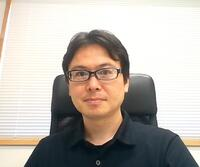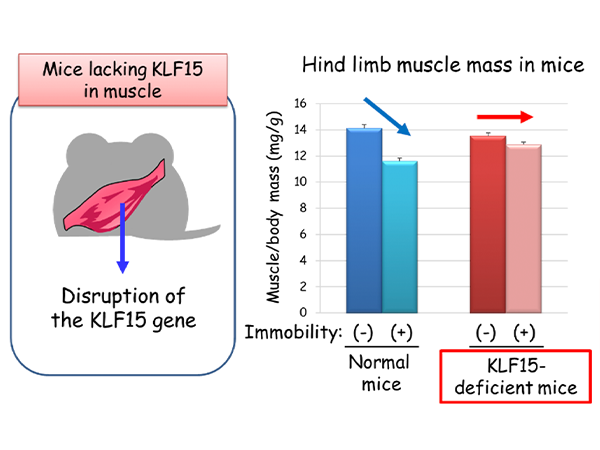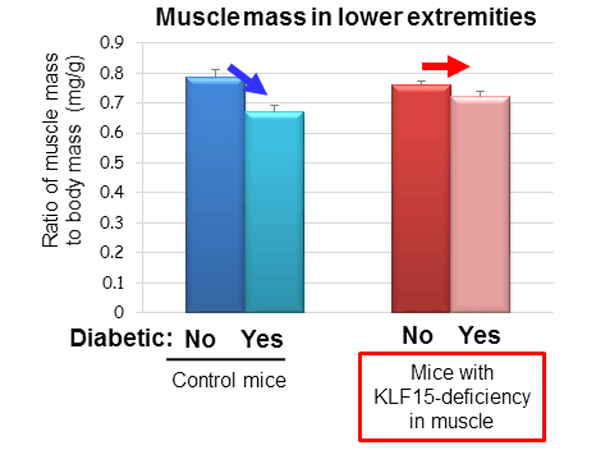What we can learn from the exosomes secreted by muscles
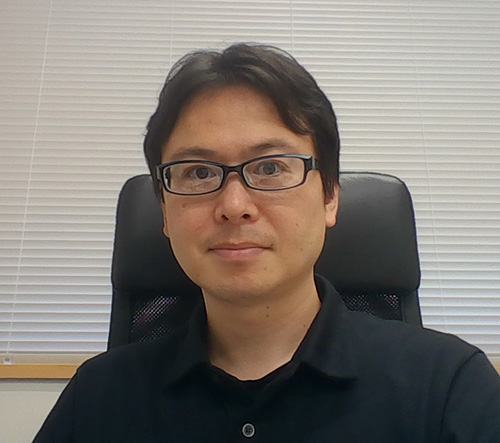
Our bodies move by contracting the muscles (skeletal muscles) that are attached along the skeleton. For example, when we raise our arms, the deltoid muscle covering the entire shoulder and the trapezius muscle covering a wide area from the neck to the back move to lift the arms. The reason why we can maintain our posture is also because of the skeletal muscles throughout our body. It is not widely known that skeletal muscles, which are used to move the body in this way, are also "secretory organs" that produce substances that regulate various physiological activities.
MAESHIGE Noriaki, an associate professor of the Graduate School of Health Sciences, has developed methods to determine the health status from substances secreted by skeletal muscles, and also to stimulate skeletal muscles. He is studying skeletal muscles with the aim of using them to maintain overall health. The health scientist has experience in rehabilitation medicine as a physical therapist and an occupational therapist and conducts research on skeletal muscles as "secretory organs."
"All organs in the body secrete information transmission substances such as cytokines as well as growth factors. The same is true of muscles, which secrete factors called myokines when they are used. Among these, I am focusing on the bag-like exosomes," says Maeshige.
"Cytokines and growth factors are single proteins, but exosomes contain various substances such as microRNAs, DNA, proteins, and metabolites that exist inside the cells. Therefore, by examining the exosomes of skeletal muscles, we can know the state of skeletal muscles. In addition, exosomes have anti-inflammatory effects, and it is known that exosomes released by skeletal muscle cells play an important role in maintaining overall health," he continues.
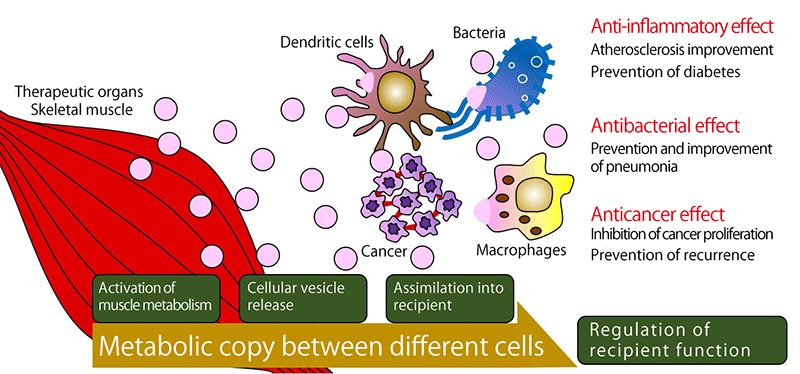
While studying at the Harvard School of Public Health in the United States, Maeshige discovered that exosomes secreted by cultured skeletal muscle cells inhibited excessive inflammation by macrophages, which act as scavengers in the body, and inhibited the growth of prostate cancer cells. Currently, he is conducting research to understand the metabolic state of muscles from skeletal muscle-derived exosomes.
Maeshige says, "When the skeletal muscle metabolism declines, the anti-inflammatory effect of exosomes also decreases, and the risk of diseases such as arteriosclerosis and dementia caused by chronic inflammation increases. In addition, the energy metabolism by muscles also decreases, making it easier to develop obesity and diabetes."
Maeshige therefore aims to quantify muscle quality using exosomes as markers.
"At present, the only way to determine the condition of muscles is to measure their quantity, weight, and hardness, or to infer the condition from images. If we can obtain more detailed biological information about the state of muscles, we will be able to provide effective nutritional and exercise guidance tailored to each individual's condition. For example, if factors related to endurance are decreasing, we can recommend muscle training; if the antioxidant effect of muscles is decreasing, we can recommend supplements," he explains.
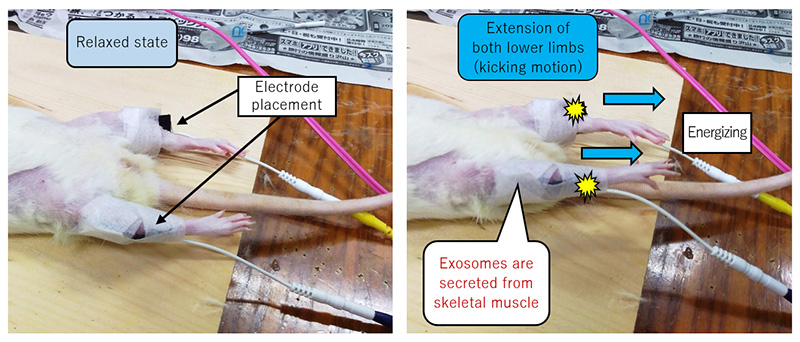
Development of skeletal muscle stimulation methods for overall health
Maeshige's laboratory is also researching methods to stimulate exosome secretion in skeletal muscles. Previous research has shown that secretion increases with strong whole-body exercise. However, if one wants to increase secretion to the level necessary to maintain good health, one needs to exercise very hard, such as pedaling an exercise bike to the point of exhaustion. Therefore, as an alternative to exercise, they are developing a physical stimulation therapy that directly stimulates skeletal muscles with electrical stimulation or ultrasonic devices.
He says, "If we can establish this method, we can promote exosome secretion in skeletal muscles and contribute to the maintenance of general health, even in people who are unable to exercise due to illness or disability, or in the elderly. Skeletal muscles are the only organs in the body that can be moved at will, and they are ideal in that they can be managed independently, consciously, and actively, with the ability to control how they are stimulated in accordance with their growth process."
Maeshige wants to further develop this research to establish a biomarker to examine the skeletal muscle condition of children during the growth process. His dream is to add skeletal muscle exosome testing as an item in medical examinations.
"It is difficult to change the people's bodies after they become an adult, but if we can know the state of the skeletal muscles from childhood, we can contribute to their healthy longevity by instructing exercise and nutrition each time we observe unhealthy signs from them. Moreover, this method is based on the idea of becoming healthy through exercise and nutrition without relying on expensive drugs and other things, so it can also correspond to SDG 3 ‘Good Health and Well-Being: Ensure healthy lives and promote well-being for all at all ages'," he says.
Maeshige has worked as a physical therapist or occupational therapist in the past and has performed rehabilitation for many patients. In addition, he emphasizes that Kobe University has a very favorable environment for both clinical and basic research.
"Rehabilitation is mainly clinical medicine for restoring the functions of walking and moving the body, and the number of universities conducting basic research in this area is quite limited. In this respect, Kobe University's Graduate School of Health Sciences has a very extensive array of experimental tools, such as equipment for causing muscle atrophy and treadmills for laboratory animals, and its technical capabilities in skeletal muscle dissection and metabolic dynamic analysis are comparable to those of Harvard University," he says.
His laboratory is also actively pursuing international initiatives, including joint research with a Chinese university as well as a Harvard University lab.
"Are you interested in doing something new that no one else has done yet? Why don't you join us and take up the challenge?"
Resume
| March 2004 | Graduated from the Faculty of Health Sciences (Occupational Therapy), Kobe University |
| March 2006 | Graduated from the Faculty of Health Sciences (Physical Therapy), Kobe University |
| April 2006 | Physiotherapist, Doi Hospital |
| March 2008 | Completed the master’s program, Graduate School of Medicine, Kobe University |
| March 2011 | Completed the doctoral program, Graduate School of Health Sciences, Kobe University |
| November 2013 | Assistant Professor, Graduate School of Health Sciences, Kobe University |
| January 2018 | Visiting Researcher, Harvard School of Public Health |
| August 2022 | Associate Professor, Graduate School of Health Sciences, Kobe University |

